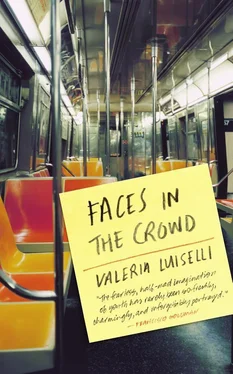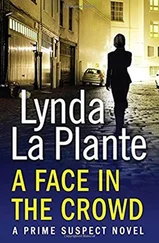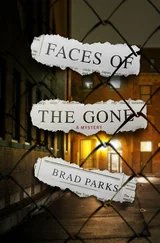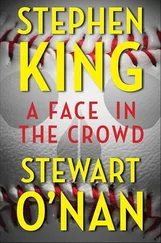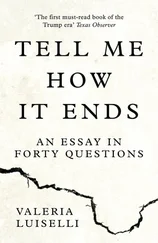And what am I supposed to do with that?
Nothing, understand it.
*
On the day of the interview I got to the office early, carrying the wooden chair I’d stolen almost a year before. White and I had decided to meet up a few hours before the interview to go over the details of our story, from that first letter with the address of Owen’s old apartment in Harlem, to the notes and Zvorsky’s translations. White was like a child, more excited than I’d ever seen him. I even thought that the shadow that had been darkening his brow for months or years had disappeared. He wanted to tell the critic about the episode in the bar, when I’d hallucinated Owen eating the remains of Pound’s peanuts while Zvorsky conducted an imaginary orchestra. White was saying this when I cut him short.
I’m not going to do it.
What?
You know I translated those poems by Owen, not Zvorsky.
Huh? Are you trying to tell me you want your name on the book? he asked, as if not wishing to understand.
No, I’m telling you I’m not going to do it.
White’s upper lip trembled slightly, he didn’t say a word.
*
Note: Owen went to Detroit a few days after Black Tuesday, when the Great Depression began.
*
My husband is packing. They’re going to start building the house in Philadelphia. I’m not really sure why an architect has to be there the whole time during the construction of a house for which he’s already drawn up the plans. But he insists that’s the way it’s done, that the architect always has to be present on site. The baby wakes up at midnight. She cries. She needs a bottle.
*
Baldy fell for Dakota. She fell for his bathtub. They began a tortuous, dangerous, multilateral relationship.
I received my last paycheck in the mail, with an absurd little note from Minni: Thanks for smiling.
I was going to leave New York as soon as possible.
*
When are you going to Philadelphia?
Next week, next month, I don’t know, as soon as possible.
So why are you packing now?
Because that’s what you just wrote. You left your document open while you were feeding the baby and I read a bit.
But it’s only a novel, none of it exists.
*
Moby existed. But he wasn’t called Moby. His name was Bobby. When I found out — Dakota told me — I was shaken by a fit of giggles, and then tears. But Bobby’s not important, because he perhaps doesn’t exist any longer.
The boy and the baby exist. A house exists, the creaking of the old floorboards, the internal shuddering of the things we own, the palimpsestic windows that hold the impressions of hands and lips. My husband and I exist, though our existence is increasingly separate, and the neighbors, the neighborhood, and the cockroaches that pass silently by also exist.
*
You’re a liar, he says.
Why?
You’re a liar.
So are you.
*
Follow the line of a story, like the line of the ass of an Ecuadorian child who was later a detective in Harlem. Crack heads with everyone, fight everything, the past, the present, so long as the story moves on. Never stray from the line. Close your eyes, put the bucket over your head, and sing, just to imagine that flat, firm, dark culito.
*
I gave away my furniture and shared all the plants — except for the dead tree — among my acquaintances. I caught the train to Philadelphia. I wanted to leave the dead tree in the cemetery there. Laura and Enea took me, they didn’t ask questions: they’re the kind of people who know how to respect others, not to ask for explanations. We went to the cemetery but never found Owen’s grave. They offered to keep the plant. We’re still watering it even though we know it’s dead, they tell me now, when we speak on the phone. The pot is by their front door. Their neighbors, born-again Christians, ask about the dead plant. They have gardenias in the entrance. They’re born-again people who ask for explanations and have gardenias. That’s what Laura and Enea tell me when we speak on the phone and I ask how the plant is doing: The neighbors hate it, you know, they’re newborn Christians, they have gardenias perpetually in flower on the porch.
*
My husband is going to Philadelphia tomorrow. He’s in the kitchen making dinner for us all. The boy sits down at the kitchen table to draw. I can hear them from the living room:
Look, Papa, I’ve made a house to live in.
Uhuh.
Do you know what happened to my house?
What?
A gyranium wind came and gobbled it up.
You don’t say gyranium, you say twister.
A twister wind came and gobbled it up.
Not twister wind, just twister.
I like gyrawind twister.
*
The day I bought a plane ticket out of New York, I tried to speak to White on the telephone. Almost a month had gone by since the last time I’d seen him, and I at least wanted to say I was leaving the city for good. Minni answered: He says he can’t talk to you now, but not to worry, I don’t know what he meant, you know how he is, but he told me to tell you not to worry. He says you might want to read the next issue of the NYRB .
*
My husband went to Philadelphia today. I suppose it was to be expected. Months and years had piled one on top of the other for this moment to arrive. First, the mutual persecution. Hounding one another until neither has a centimeter of air. Conceiving an infinite hatred of the other. Not so much boredom (that would have been to remain at his side for twenty years and end up sleeping in separate beds). Not so much the contempt (the inadequate size of his hands, the smell of his sleeping body, the taste of his sex). But the hatred. Breaking him, emotionally decimating him again and again. Allowing oneself to be broken. Writing this is coarse. But reality is even more so. Later, the moral accusations. The list of the defects of the accused, always accompanied by the tacit list of the virtues of the accuser. Our final hours together were predictable: the temperature of the arguments rising, the almost comic melodrama of the play beginning. Faces, masks. One shouting, the other crying; and then, change masks. For one, two, three, six hours, until the world finally falls apart: tomorrow, this Sunday, next Wednesday, Christmas. But in the end, a strange peace, gathered from who knows what rotten gut. It was a single gesture that broke me — that finished breaking me: his cry of joy when he had closed the front door.
*
Dakota wanted to organize a going-away party for me. We decided to hold it in the empty apartment. Her ex-boyfriend came, and some of the rotating members of the band. Pajarote came with Fani. We didn’t invite Moby alias Bobby. Baldy turned up with his ex-wife — a slightly silly Mexican criolla who had put herself through a master’s at NYU only to end up teaching Spanish in a Brooklyn secondary school; and she brought her new partner, another Mexican criolla who repeatedly quoted lyrics by Joaquín Sabina. And that was all.
In the kitchen, Dakota’s ex-boyfriend asked me why I was just up and leaving like that. I told him that I’d turned into a ghost; or maybe that I was the only living girl in a city of ghosts; that, in any case, I didn’t like dying all the time. He stroked my forehead. I didn’t know what to do. Spontaneous gestures paralyze me. Perhaps I could have touched his face; licked the naked scar that furrowed it into two possible faces. I could have told him that I was going because I was incapable of sustaining and inhabiting the worlds I myself had fabricated, that I also had a scar splitting my face in two. Perhaps I could have made love to him in the bathtub. Perhaps I did make love to him.
*
The rest isn’t important. My husband moved to another city. Let’s say, Philadelphia. He went out the front door with a single suitcase and a portfolio full of plans, and that was the last we heard of him. Maybe he found himself. Let’s say he met other women: casual mulattas, an elegant Japanese lady, neocolonialist gringas who soothed their first-world consciences by sleeping with third-world intellectuals, and even Mexican criollitas for whom life was a compendium of songs by Joaquín Sabina. Or maybe he just got fed up, locked himself in an apartment in Philadelphia, and allowed himself to slowly die.
Читать дальше
